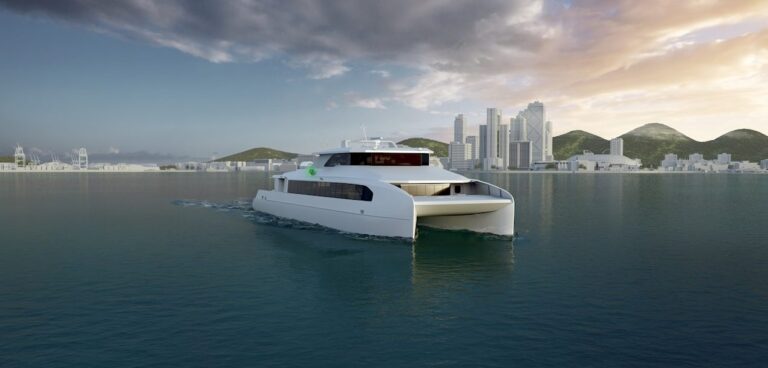Marine power specialist ABB says it has secured a contract with Haemin Heavy Industries shipyard to provide a complete power and propulsion solution for Busan Port Authority’s first all-electric passenger ferry.
The ferry represents the first commitment by South Korean authorities to a plan that will see 140 state-owned conventionally powered vessels replaced with those operating on cleaner alternatives by 2030. As the first system integrator chosen to support this initiative, ABB says it will deliver an end-to-end electric power and propulsion solution for the twin-hulled ferry, which is due for delivery in 2022.
The 40m catamaran will have the capacity to carry up to 100 passengers and five crew members and will operate between the South Korean city of Busan’s North and South ports, taking about one hour to complete a return journey with an average operating speed of 13kts (24km/h). It will be powered by two 1,068kWh battery packs, which will provide enough power for the ferry to complete up to four return journeys before charging from shore during the vessel’s overnight stops.
ABB says its onboard DC grid power distribution system will ensure the battery output is delivered to the vessel’s subsystems in the most optimal way, while its power and energy management system (PEMS) will control the overall power distribution, increase fault tolerance and provide a high degree of reliability.
Busan-based shipbuilder Haemin, which specializes in lightweight, environmentally friendly vessels, and ABB have also signed an agreement to collaborate on further vessel projects in the future.
“We are truly proud to have been chosen as technology supplier for the first vessel in South Korea’s clean fleet renewal scheme,” said Juha Koskela, ABB Marine & Ports’ division president. “Our agreement with Haemin represents a major advance in the local market, supporting South Korea’s plans for sustainable shipping, as part of our strategy for reducing global vessel emissions. Sustainability is a key part of the value that we create for all of our stakeholders, and the new partnership with Haemin is an example of how we can enable a low-carbon society and help preserve resources.”



